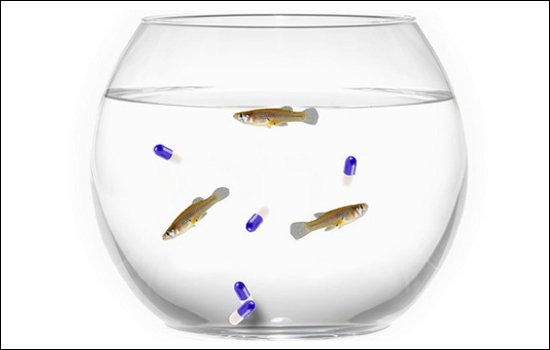HQ Team
September 4, 2024: Anti-depressant fluoxetine or Prozac from human residues of urine and faeces have been detected in fish in fresh waters of Australia, a pollutant that altered the aquatic vertebrate animal’s body condition and reproduction, according to a joint study by Australian and Italian biologists.
The five-year study found that long-term exposure to pharmaceutical pollutants impacted fish behaviour, life history and reproductive traits.
The investigation was carried out in wild-caught guppies exposed to Prozac. The research team exposed guppies to three environmentally relevant concentrations of fluoxetine over multiple generations.
Researchers measured key life-history traits such as body condition, colouration, and gonopodium size — a modified anal fin used as a reproductive organ in males — along with critical sperm traits including vitality, number, and velocity.
“Even at low concentrations, fluoxetine altered the guppies’ body condition and increased the size of their gonopodium, while simultaneously reducing sperm velocity—an essential factor for reproductive success”, said Dr Upama Aich, from the Monash University School of Biological Sciences.
‘Risk-taking behaviours’
Male guppies were the focus due to their heightened sensitivity to environmental shifts, particularly in traits tied to behaviour, body condition, and reproduction.
“Fluoxetine exposure also significantly reduced the behavioural plasticity of guppies, leading to a lower capacity of the individuals to adjust their activity and risk-taking behaviours across contexts,” said Assistant Professor Giovanni Polverino, from the University of Tuscia.
Pharmaceutical pollutants, such as antidepressants like fluoxetine, have become a pervasive issue in water bodies worldwide. These pollutants, often introduced through wastewater discharge, persist at low levels in rivers, lakes, and oceans.
When Prozac is taken by patients, their bodies do not absorb all of the medication. The residue is excreted in urine or faeces, which is then flushed through toilets and passes into waterways and waste treatment centres. Unused or expired medication is also frequently – and improperly – disposed of through toilets.
Panic disorder
Fluoxetine, sold under the brand name Prozac, among others, is an antidepressant used for the treatment of major depressive disorder, obsessive-compulsive disorder, anxiety, bulimia nervosa, panic disorder, and premenstrual dysphoric disorder.
The patient’s residue remains in the water and aquatic life in waterways can absorb these left-over pollutants. According to some estimates, the “bioavailability” of fluoxetine is roughly about 72%. Bioavailability is the portion of a drug or other substance that enters the bloodstream. The remaining is excreted as waste.
Fluoxetine exposure disrupted the natural correlations between key traits in the tested guppies. For instance, the expected link between activity levels and body condition, and between gonopodium size and sperm vitality, was altered.
Water treatment plants
This disruption indicates that the pollutant is interfering with the natural trade-offs fish make between survival and reproduction, according to a Monash University statement.
The study revealed the extensive and nuanced impacts of pharmaceutical pollutants on aquatic life. Even at waste treatment centres, where wastewater is treated to remove contaminants, many of the modern-day water treatment plants were not designed to filter out chemicals related to pharmaceuticals.
These pollutants can be absorbed by fish.
“The disruption of behavioural plasticity and the altered correlations between critical traits could undermine fish populations’ ability to adapt to environmental challenges, threatening their long-term survival,” said Professor Bob Wong, from the School of Biological Sciences and senior author of the study.
The study, led by Dr Aich from the Monash University School of Biological Sciences and Giovanni Polverino from the University of Tuscia, was published in the Journal of Animal Ecology.




